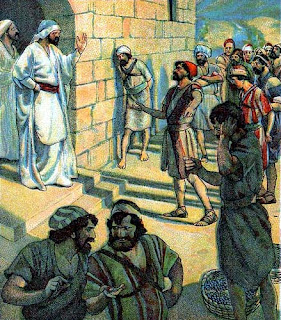Gospel Tidings and Good News
In the ancient Greek city of Priene, in current day Turkey, the following inscription was found. It was justifying the measuring of the years — a new calendar dating system — from the birth of its protagonist. Its phrasing will, we are sure, be familiar to many.
“God, who has ordered all things and is deeply concerned with our lives, has arranged all things well by giving us the Holy One, filled with virtue that he might benefit humankind, sending him as saviour, both for us and for our descendants, that he might end war and put all things in order. His revelation (excelling even what we hoped for), surpasses all who have done us good before, and all who will come hereafter. The divine birth of the Holy One was the beginning of the Gospel for the world that came about because of him.”
What won’t be quite so familiar is who, in fact, is being spoken of.
Dating from 9 BCE, this inscription is referring to the Emperor Octavian, better known as Caesar Augustus, and the Good News, the ‘Gospel’, referred to is the ushering in of the Pax Romana. The Greek term evangelion, meaning “good news”, was at the time of the Roman Empire in common use to herald the good news of the arrival of a new kingdom.
Ending the civil war that had distracted Rome, Augustus reconquered and enlarged the territory of the Roman Empire, bringing peace and prosperity. Good News, if you were one of the few whose way of life was enriched by more resources, more labourers, and more affirmation that you were better and deserved all this. Good News, unless you were one of the millions killed, enslaved, or generally brutalised by an empire in which anyone not a Roman Citizen was regarded as only half human. For those torn from their homelands, who had seen their identities and ways of life destroyed, swallowing the Gospel of the Pax Romana as definitively Good News may have been a bitter pill they were unable to take.
It would be another fifty or so years before a different kind of Good News was announced, in the same language and in the same familiar form to those listening — the Gospel of Jesus: same linguistic references, but utterly different and shocking as they heard it.
The Gospel we are familiar with from about 50 CE didn’t fall out of the sky: it was awaited, longed for, needed; it was a response to the older, different Gospel, that different kind of Good News. No matter how it has come to be viewed over the centuries, the Gospel we know wasn’t about putting forward new dogmas or novel religious teachings, to be bedded in on the layer of pre-existing society. It was proposing a different Good News, a wholly new and different way of living together, a Gospel for the many not just the few.
Those first hearing the Good News of Jesus, as it is called in the written Gospel of Mark, would have got what was being said, as surely as if we today swapped out in our national anthem the name ‘Jesus’ for the title ‘Queen’. They wouldn’t have been invested in going over any deeper meaning to the individual titles and claims. They would have known at once that this person was being set up as an alternative vision, a challenge. They would have seen the kingdom of Jesus set up as a challenge to the kingdom of their day. Indeed, rather than merely swapping out one ruler for another, in this new Gospel the world order upheld by the powerful, wealthy, privileged, monarch against the backdrop of Rome was radically contrasted with one where the poor, the uneducated, the vulnerable are valued, and where good things are shared not hoarded.
Well: a world where the few benefit from the labour of the many, and where the few enjoy the enriching of their lives on the back of the suffering of others, a world where cultural and personal identities are fragmented and disintegrated in the name of an economy that is advantageous mostly to those at the top, such a world is a world we recognise, more surely than we recognised the inscription we began with.
We think this is important. If we can liberate the Good News from the dogmatic terms and the bespoke religious ideas that specialists have bound it up in, then perhaps we can recognise too the various attempts at living differently, counter-culturally, from a profoundly unjust and uncaring world, a world we often find ourselves in, too.
The Good News we share today is that ‘Gospel’ doesn’t require you to believe certain religious ideas or agree with special formulas or terms. ‘Gospel’ is a challenge.
Which message do you consider ‘Good News’? Are you with Augustus, or for Jesus? Caesar, or Christ? The choice is yours; and what that means in the concrete is all part of a social experiment that never seems to end.




No comments:
Post a Comment
We welcome your enquiry and like to converse. This is where we set out some of what we offer. If you don't like what you read, scroll on by. We reserve the right to disregard unappreciative audiences.
Any personal email addresses supplied in your comments will be removed from posts during the moderation process to protect your data.